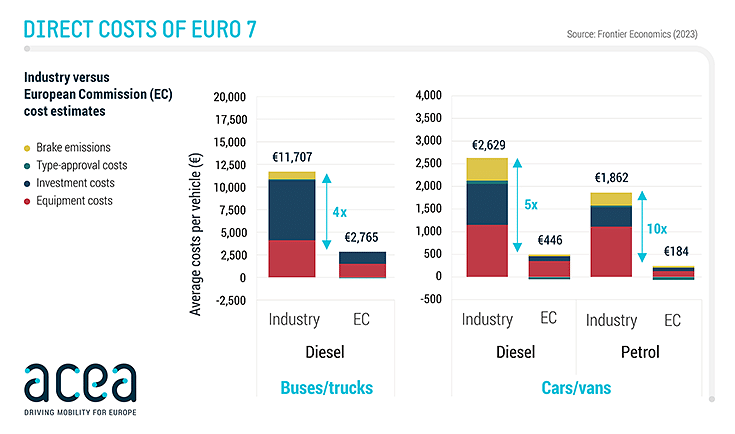Euro 7’s direct costs 4 to 10 times higher than EU estimates: new study
Compliance with the proposed Euro 7 regulation will require OEMs to install additional hardware and invest in the development and rollout of new technologies – which will affect manufacturing costs of new Euro 7 compliant vehicles.
The Euro 7 proposal on pollutant emissions would lead to direct cost increases that are 4 to 10 times higher than those cited by the European Commission, according to a new study.
The proposed Euro 7 regulation will increase the manufacturing costs of cars, vans, trucks, and buses. A study by Frontier Economics, ‘Regulatory costs of Euro 7 – Findings from an industry survey’, commissioned by ACEA, provides an independent and compliant evaluation of the incremental costs per new Euro 7 vehicle, based on estimates by industry experts.
The study calculates the per vehicle costs at around 2,000 euros (Rs 175,000) for cars and vans with an internal combustion engine, and close to 12,000 euros (Rs 10.54 lakh) for diesel trucks and buses. These figures are 4 to 10 times higher than the Commission’s estimates in its Euro 7 impact assessment (180-450 euros for cars and vans, and 2,800 euros for trucks and buses).

ACEA-commissioned study calculates the per vehicle costs at around 2,000 euros (Rs 175,000) for cars and vans with an internal combustion engine, and close to 12,000 euros (Rs 10.54 lakh) for diesel trucks and buses.
These estimates comprise direct manufacturing costs only, primarily for equipment and investments. It is important to note that these additional costs do not correspond with purchase prices; instead, they drive up prices for end-users even further. Price increases would likely therefore be higher than the figures cited in the study.
With current Euro 6/VI rules, the EU has the most comprehensive and stringent standards for pollutant emissions (such as NOx and particulate matter) in the world. Exhaust emissions are already at a barely measurable level thanks to state-of-the-art vehicle technology.
“The European auto industry is committed to further reducing emissions for the benefit of the climate, environment, and health. However, the Euro 7 proposal is simply not the right way to do this, as it would have an extremely low environmental impact at an extremely high cost,” stated Sigrid de Vries, Director General of the European Automobile Manufacturers’ Association (ACEA).
“Greater environmental and health benefits will be achieved by the transition to electrification, while at the same time replacing older vehicles on EU roads with highly efficient Euro 6/VI models.”
In addition to direct costs, the Euro 7 proposal will trigger indirect costs, such as higher fuel consumption. Over a vehicle’s lifetime, this could increase fuel costs by 3.5% – amounting to an extra 20,000 euros (Rs 17.57 lakh) for long-haul trucks and 650 euros (Rs 57,000) for cars and vans.
These indirect costs – which are ignored in the Commission’s impact assessment – come on top of the direct costs. They would add to the total cost of owning a vehicle, placing additional financial pressures on consumers and businesses at a time of high inflation and rising energy prices.
According to ACEA, recent studies have shown that replacing older, more polluting vehicles on EU roads with the latest Euro 6/VI vehicles – alongside the electrification of new vehicles – would deliver an 80% reduction in road transport NOx emissions by 2035 (compared to 2020). Over the same period, the most stringent Euro 7 scenarios (ie limits for NOx and particles set at zero) would reduce road transport NOx emissions by up to a further 4% for cars and vans and 2% for trucks, compared to Euro 6/VI.
The European Automobile Manufacturers’ Association (ACEA) represents the 14 major Europe-based car, van, truck and bus makers: BMW Group, DAF Trucks, Daimler Truck, Ferrari, Ford of Europe, Honda Motor Europe, Hyundai Motor Europe, Iveco Group, Jaguar Land Rover, Mercedes-Benz, Renault Group, Toyota Motor Europe, Volkswagen Group, and Volvo Group.
ALSO READ: Nitin Gadkari urges Indian carmakers to gear up for BS7 to keep up with EU norms
RELATED ARTICLES
Autoliv Plans JV for Advanced Safety Electronics With China’s HSAE
The new joint venture, which is to be located strategically near Shanghai and close to several existing Autoliv sites in...
JLR to Restart Production Over a Month After September Hacking
Manufacturing operations at the Tata Group-owned British luxury car and SUV manufacturer were shut down following a cybe...
BYD UK Sales Jump 880% in September to 11,271 units
Sales record sets the UK apart as the largest international market for BYD outside of China for the first time. The Seal...






 By Autocar Professional Bureau
By Autocar Professional Bureau
 23 May 2023
23 May 2023
 3491 Views
3491 Views





 Ajit Dalvi
Ajit Dalvi




